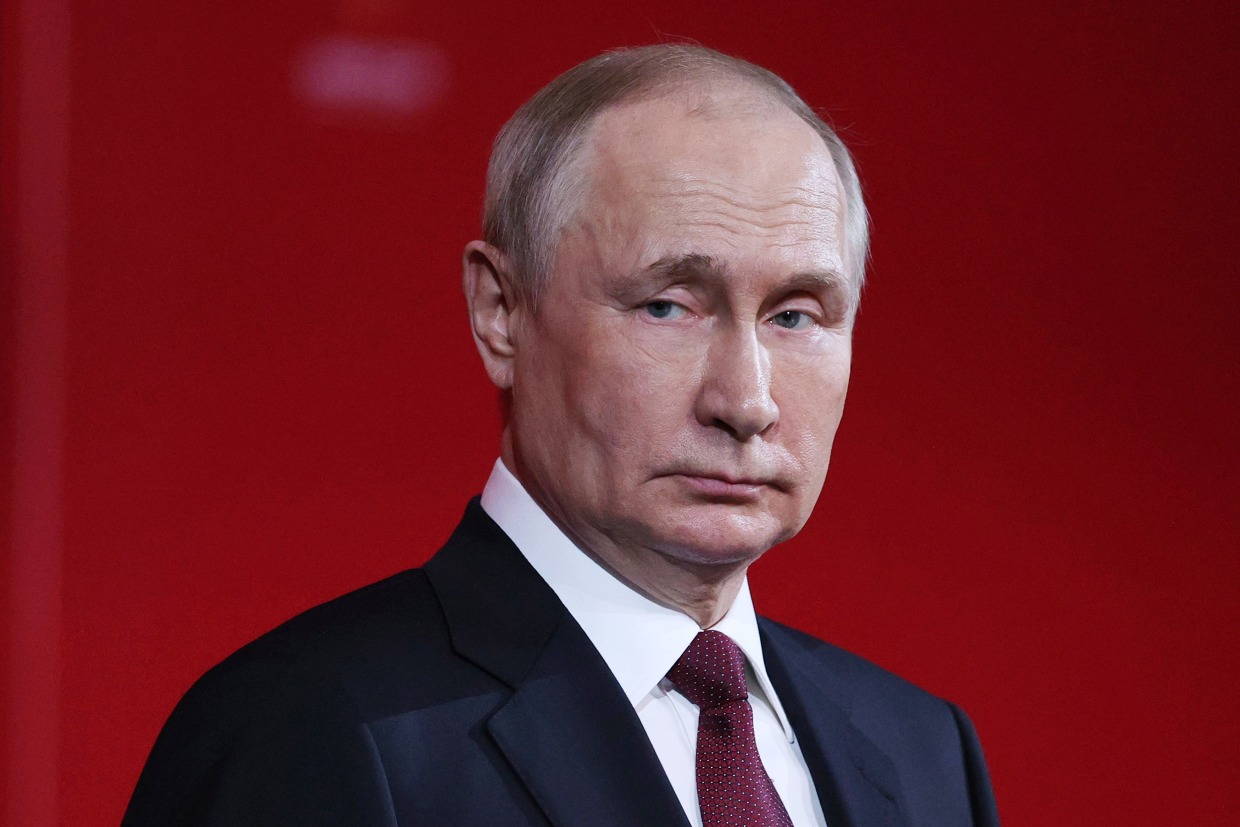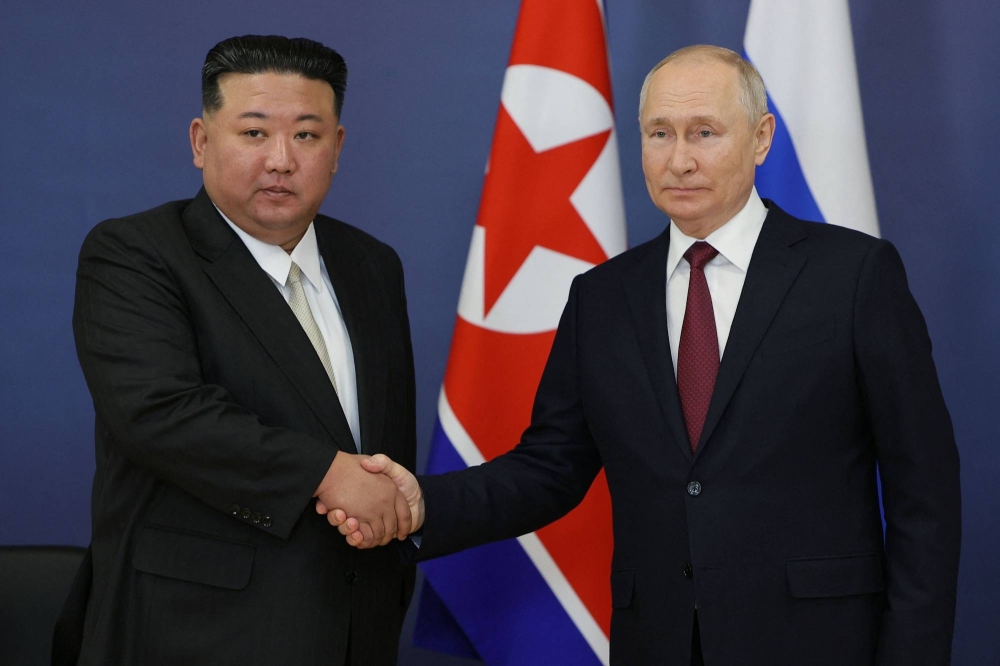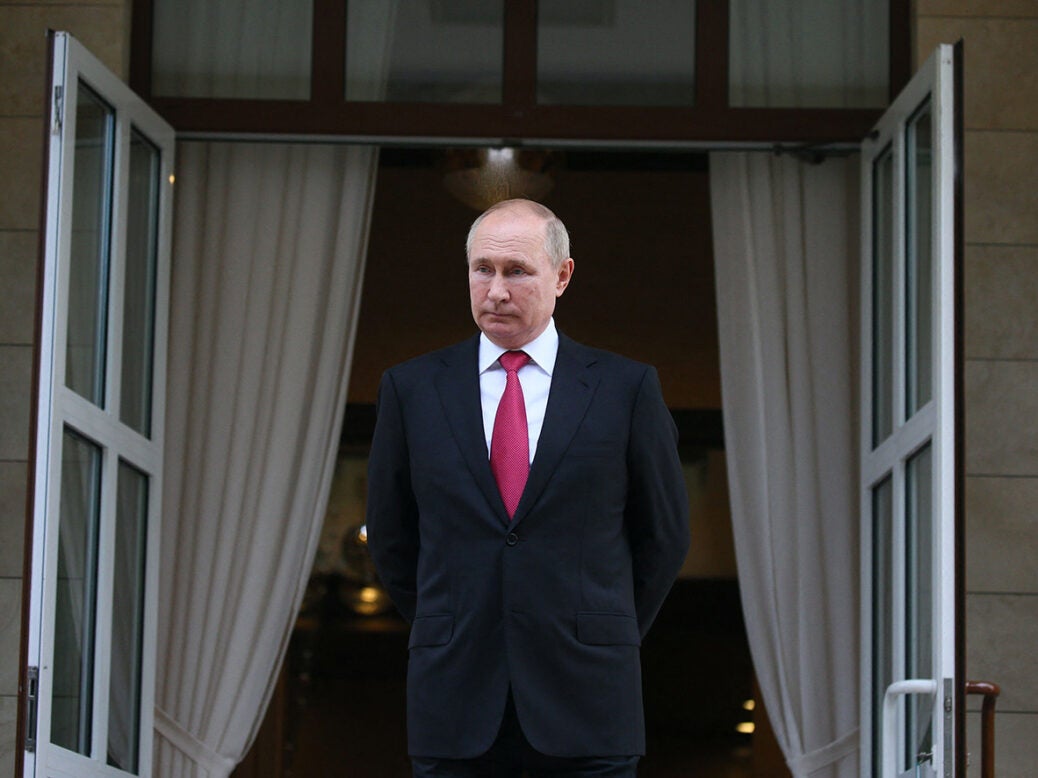Vladimir Putin: A Complex Portrait of Russia's Enigmatic Leader
 Vladimir Putin, the enigmatic figure who has dominated Russian politics for more than two decades, remains a subject of fascination and controversy both domestically and internationally. Born on October 7, 1952, in Leningrad (now Saint Petersburg), Putin's journey from KGB operative to president of Russia has been marked by intrigue, power struggles, and a firm grip on authority. In this article, we delve into the complexities of Putin's leadership, exploring his rise to power, his governing style, and the implications of his rule for Russia and the world.
Vladimir Putin, the enigmatic figure who has dominated Russian politics for more than two decades, remains a subject of fascination and controversy both domestically and internationally. Born on October 7, 1952, in Leningrad (now Saint Petersburg), Putin's journey from KGB operative to president of Russia has been marked by intrigue, power struggles, and a firm grip on authority. In this article, we delve into the complexities of Putin's leadership, exploring his rise to power, his governing style, and the implications of his rule for Russia and the world.
Putin's ascent to power can be traced back to the chaotic aftermath of the Soviet Union's collapse in 1991. As the Soviet empire crumbled, leaving Russia in a state of economic turmoil and political uncertainty, Putin emerged as a key figure in the transition period. Rising through the ranks of the KGB, the Soviet Union's notorious intelligence agency, Putin developed a reputation as a shrewd and capable operative. His appointment as head of the Federal Security Service (FSB), the KGB's successor agency, in 1998, further solidified his position within the Russian political establishment. However, it was Putin's meteoric rise to the presidency in 2000 that catapulted him into the spotlight. Following the resignation of President Boris Yeltsin, Putin assumed the role of acting president, positioning himself as a strong and decisive leader capable of restoring stability and order to a country plagued by economic crisis and internal strife. His landslide victory in the subsequent presidential election cemented his hold on power and signaled the beginning of a new era in Russian politics.
However, it was Putin's meteoric rise to the presidency in 2000 that catapulted him into the spotlight. Following the resignation of President Boris Yeltsin, Putin assumed the role of acting president, positioning himself as a strong and decisive leader capable of restoring stability and order to a country plagued by economic crisis and internal strife. His landslide victory in the subsequent presidential election cemented his hold on power and signaled the beginning of a new era in Russian politics.
Throughout his tenure as president, and later as prime minister and president again, Putin has cultivated an image of strength, control, and unwavering resolve. His authoritarian style of governance, characterized by centralized authority, limited political opposition, and suppression of dissent, has drawn criticism from human rights organizations and democratic governments alike. Under Putin's rule, independent media outlets have been muzzled, political opponents have been silenced or marginalized, and civil liberties have come under increasing scrutiny. Yet, despite these authoritarian tendencies, Putin's leadership also rests on a foundation of popular support and nationalist sentiment. His efforts to restore Russia's status as a global power, assert its interests on the world stage, and defend its sovereignty against perceived Western encroachment have resonated with many Russians who view him as a strong and patriotic leader. Putin's popularity, bolstered by state-controlled media and a carefully crafted public image, has helped him weather political challenges and maintain his grip on power.
Yet, despite these authoritarian tendencies, Putin's leadership also rests on a foundation of popular support and nationalist sentiment. His efforts to restore Russia's status as a global power, assert its interests on the world stage, and defend its sovereignty against perceived Western encroachment have resonated with many Russians who view him as a strong and patriotic leader. Putin's popularity, bolstered by state-controlled media and a carefully crafted public image, has helped him weather political challenges and maintain his grip on power.
Internationally, Putin's tenure as Russia's leader has been marked by assertive foreign policy maneuvers and strategic geopolitical calculations. From the annexation of Crimea in 2014 to military intervention in Syria and efforts to undermine Western alliances and institutions, Putin has pursued a vision of Russian resurgence that seeks to challenge the dominance of the United States and its allies. His confrontational stance towards the West, coupled with Russia's vast energy resources and nuclear arsenal, has made him a formidable player on the global stage.
However, Putin's assertive foreign policy agenda has also fueled tensions with neighboring countries and drawn condemnation from the international community. Accusations of election interference, cyber warfare, and human rights abuses have strained Russia's relations with Europe and the United States, leading to economic sanctions and diplomatic isolation. Moreover, Putin's support for authoritarian regimes and non-state actors in regions such as the Middle East and Eastern Europe has raised concerns about Russia's role in destabilizing global security and undermining democratic norms. As Putin enters his third decade in power, the future of Russia and its place in the world remains uncertain. Economic stagnation, demographic challenges, and internal discontent pose formidable obstacles to Putin's continued rule, while geopolitical rivalries and shifting alliances reshape the global landscape. Whether Putin will seek to extend his grip on power through constitutional amendments, political maneuvering, or succession planning remains to be seen. Yet, one thing is clear: the legacy of Vladimir Putin, for better or worse, will leave an indelible mark on Russia and the world for generations to come.
As Putin enters his third decade in power, the future of Russia and its place in the world remains uncertain. Economic stagnation, demographic challenges, and internal discontent pose formidable obstacles to Putin's continued rule, while geopolitical rivalries and shifting alliances reshape the global landscape. Whether Putin will seek to extend his grip on power through constitutional amendments, political maneuvering, or succession planning remains to be seen. Yet, one thing is clear: the legacy of Vladimir Putin, for better or worse, will leave an indelible mark on Russia and the world for generations to come.
Vladimir Putin's leadership of Russia is a complex and multifaceted phenomenon that defies easy categorization. From his humble beginnings as a KGB operative to his current status as one of the world's most powerful and controversial leaders, Putin's rise to power has been marked by ambition, cunning, and a relentless pursuit of authority. While his authoritarian style of governance and assertive foreign policy have drawn criticism from many quarters, Putin's popularity at home and his ability to project strength abroad have ensured his enduring influence on Russian politics and global affairs. As Russia continues to navigate the challenges of the 21st century, the role of Vladimir Putin and his vision for the country will remain central to its trajectory and its place in the world. Moreover, understanding Putin's leadership requires a deeper examination of his personality and motivations. Often described as enigmatic and inscrutable, Putin has cultivated an aura of mystique around himself, carefully controlling his public image while revealing little about his inner thoughts and feelings. This deliberate opacity has only added to the fascination and speculation surrounding his persona, fueling theories and conjectures about his true intentions and ambitions.
Moreover, understanding Putin's leadership requires a deeper examination of his personality and motivations. Often described as enigmatic and inscrutable, Putin has cultivated an aura of mystique around himself, carefully controlling his public image while revealing little about his inner thoughts and feelings. This deliberate opacity has only added to the fascination and speculation surrounding his persona, fueling theories and conjectures about his true intentions and ambitions.
Some analysts argue that Putin's authoritarian tendencies and aggressive foreign policy are driven by a desire to consolidate power and preserve his own political survival. They point to his efforts to suppress dissent, marginalize opposition figures, and centralize control over key institutions as evidence of his authoritarian instincts. Additionally, Putin's assertive posture towards the West and his willingness to challenge established norms and conventions are seen as a means of deflecting attention away from domestic problems and rallying support behind a common enemy. Others interpret Putin's actions through the lens of Russian history and geopolitics, arguing that his policies are rooted in a deep-seated desire to restore Russia's status as a great power and safeguard its national interests. From his support for Russian-speaking populations in neighboring countries to his defense of traditional values and cultural heritage, Putin's rhetoric often invokes themes of Russian nationalism and historical pride. By positioning himself as a defender of Russian identity and sovereignty, Putin has tapped into a deep well of popular sentiment that resonates with many Russians who feel marginalized or disaffected by the rapid changes of the post-Soviet era.
Others interpret Putin's actions through the lens of Russian history and geopolitics, arguing that his policies are rooted in a deep-seated desire to restore Russia's status as a great power and safeguard its national interests. From his support for Russian-speaking populations in neighboring countries to his defense of traditional values and cultural heritage, Putin's rhetoric often invokes themes of Russian nationalism and historical pride. By positioning himself as a defender of Russian identity and sovereignty, Putin has tapped into a deep well of popular sentiment that resonates with many Russians who feel marginalized or disaffected by the rapid changes of the post-Soviet era. Furthermore, Putin's leadership style can be characterized by pragmatism and flexibility, as evidenced by his willingness to adapt to changing circumstances and seize opportunities as they arise. Whether cozying up to Western leaders in search of economic partnerships or forging alliances with authoritarian regimes in pursuit of geopolitical objectives, Putin has demonstrated a keen sense of realpolitik that allows him to navigate the complexities of global politics with relative ease. His ability to strike a balance between confrontation and cooperation, coercion and diplomacy, has earned him a reputation as a skilled tactician and strategist on the world stage.
Furthermore, Putin's leadership style can be characterized by pragmatism and flexibility, as evidenced by his willingness to adapt to changing circumstances and seize opportunities as they arise. Whether cozying up to Western leaders in search of economic partnerships or forging alliances with authoritarian regimes in pursuit of geopolitical objectives, Putin has demonstrated a keen sense of realpolitik that allows him to navigate the complexities of global politics with relative ease. His ability to strike a balance between confrontation and cooperation, coercion and diplomacy, has earned him a reputation as a skilled tactician and strategist on the world stage.
However, Putin's leadership is not without its contradictions and challenges. Despite his efforts to project an image of strength and invincibility, Putin faces mounting pressure from both domestic and international sources. Economic sanctions, falling oil prices, and the COVID-19 pandemic have taken a toll on Russia's economy, exacerbating social inequalities and fueling discontent among ordinary Russians. Moreover, Putin's authoritarian grip on power has stifled political innovation and economic diversification, leaving Russia overly reliant on natural resources and vulnerable to external shocks.In the realm of foreign policy, Putin's confrontational stance towards the West has alienated traditional allies and sparked fears of a new Cold War. From the conflict in Ukraine to the poisoning of former Russian spy Sergei Skripal in the United Kingdom, Putin's regime has been implicated in a series of international incidents that have strained Russia's relations with the West and raised concerns about its intentions. As geopolitical tensions escalate and global competition intensifies, the prospect of a major confrontation between Russia and its adversaries looms ever larger on the horizon.
 In conclusion, Vladimir Putin's leadership of Russia is a complex and multifaceted phenomenon that defies easy analysis. From his authoritarian style of governance to his assertive foreign policy agenda, Putin's rule has left an indelible mark on Russia and the world. Yet, beneath the surface lies a man of contradictions and complexities, whose true motivations and intentions remain shrouded in mystery. As Russia continues to grapple with the challenges of the 21st century, the role of Vladimir Putin and his vision for the country will continue to shape its trajectory and its place in the world.
In conclusion, Vladimir Putin's leadership of Russia is a complex and multifaceted phenomenon that defies easy analysis. From his authoritarian style of governance to his assertive foreign policy agenda, Putin's rule has left an indelible mark on Russia and the world. Yet, beneath the surface lies a man of contradictions and complexities, whose true motivations and intentions remain shrouded in mystery. As Russia continues to grapple with the challenges of the 21st century, the role of Vladimir Putin and his vision for the country will continue to shape its trajectory and its place in the world.







































































